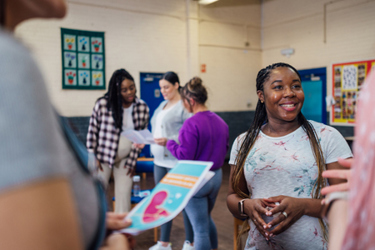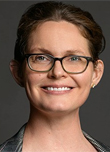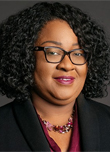Maintaining Trust Between Clinical Researchers And Communities Requires Commitment & Candor
By Amanda Wagner Gee, Lisa Lewis, and Esther Krofah

Community leaders, clinical trial sites, industry, research groups, and others have attempted to build public trust in clinical research over the years. Their efforts include clinical trial awareness initiatives and industry consortia, as well as initiatives to build infrastructure, flexible regulation, and formal ability to build relationships necessary to conduct research closer to and with communities. However, these community relationships, built on hard-won trust, are at risk. From the erosion of funding sources to the uncertainties faced by research programs addressing unmet needs of vulnerable populations across geographies and disease areas, clinical research now stands at an inflection point.
Silas Buchanan, the CEO of Our Health Community -- a company that collaborates with community serving organizations (CSOs), academia and the pharmaceutical industry -- has seen and heard how the shifting landscape is impacting trust across communities.
“As we know, trust is hard to gain and easy to lose,” said Buchanan. “I am hearing from my stakeholders, that the current changes are putting hard-earned and trusted relationships between communities and researchers at risk. These relationships have taken years, if not decades to build.”
Mitigating these risks and maintaining trust built over the years requires continued investment, transparency, and enduring partnerships, to be sustained amid an evolving research environment with continually shifting priorities in funding and research focus.
Many industry partners remain committed to championing inclusive research, access and representation in clinical trials. Others are continuing their efforts but are now less inclined to discuss their initiatives publicly. Government agencies are rescinding investments, guidance, and programs that made these advancements possible. In this moment, information and transparency are the currency of trust.
This call to action has been echoed across CSOs, research sites, and industry sponsors, in discussions with ENRICH-CT, a multistakeholder coalition convened by FasterCures at the Milken Institute, focused on expanding access to clinical research and bringing it closer to communities.
Despite current shifts, recent changes can be viewed as a transformative opportunity as we work to fulfill our ethical and scientific obligations. Gladys Maestre, MD, Ph.D., director of the Alzheimer's Disease Resources Center for Minority Aging Research and Professor of Neuroscience at the University of Texas Rio Grande Valley School of Medicine, acknowledges the task of navigating the evolving landscape, and the potential opportunity.
"No one doubts that our health system needs to change. There’s so much intellectual and social capital in this country that what feels like a crisis now might be the beginning of something better — the transformation of our health system” said Dr. Maestre during a recent ENRICH-CT coalition convening.
Like Dr. Maestre, some stakeholders see the opportunity for transformation and are still committed to ensuring that all populations are included in research, with a goal of bringing safe and effective innovations to all populations.
Building and sustaining the infrastructure to do this work requires funding, resources, and enduring support. Here are some examples of funding commitments offering potential support for CSOs and projects focused on clinical research access. Of note, these resources are cited as active at the time of this article submission based on publicly available sources; the status of each funding source is subject to change.
Pharmaceutical Industry
- Industry partnerships continue through public-private collaborations including the AstraZeneca’s Creating Health Access for Next Generation Equity, Pfizer Communities Forward Grant Program, Genentech’s Advancing Inclusive Research Site Alliance, the Alliance for Representative Clinical Trials launched by The National Minority Quality Forum, and ACRO’s D&I Site Resource Grants.
Philanthropic Organizations
- The Robert Wood Johnson Foundation’s Research to Advance Racial & Indigenous Health Equity and Exploring Equitable Futures are among new opportunities. Others include AstraZeneca Foundation’s ACT on Health Equity: Community Solutions Challenge, ABIM Foundation’s Building Trust: Advancing Health Equity, and the CareQuest Institute’s Advancing Equity Through Oral Health Fund.
Health Systems
- Health systems, such as Sanford Health Community Dividend Fund, and Ochsner Health Excellence Fund, contribute funding to sustain community research partnerships.
Corporations
- Additional support flows through innovative collaborations, such as Morgan Stanley’s Alliance for Children’s Mental Health Innovation, Truist Foundation’s Building Career Pathways to Economic Mobility, Walmart’s Spark Good Local Grants, and several AI-focused funding opportunities, including AIM-AHEAD Hub-Specific Project: AI for Community-Based Participatory Research and Fostering Trustworthy AI Research to Advance Health and Medicine for All Americans.
Other Resources
- Association of American Medical Colleges Center for Health Justice: Funding Opportunities
- American Association of Colleges of Pharmacy: Research Funding Opportunities
- Grant Watch (Weekly NIH Grant Status Updates)
- NIH Fogarty International Center: Non-NIH Funding Opportunities, Grants, and Fellowships
We must remain committed to democratizing access to research and maintaining trust to achieve better health outcomes for all. Communities across the country have long adapted to uncertainty and instability and met these challenges with resourcefulness, and persistence. Now, research organizations face similar challenges.
“People in the community are used to dealing with uncertainty,” notes Dr. Maestre. “Many face tough situations just trying to meet basic needs. I tell our research participants that we, as researchers, also go through challenges. This isn’t the first time things have felt so uncertain, and it probably won’t be the last. But we keep showing up because the work we’re doing matters.”
Research organizations should lean into transparency and consistent communication to show their commitment. Now is the time to demonstrate trustworthiness and rebuild trust to ensure access to research advances and biomedical innovation for all communities. This is our moment to acknowledge the changing landscape and continue this important work, despite the challenges.
Silas Buchanan echoed with this call to action: “After spending my entire professional career bridging so many gaps in trust, educating both community leaders and researchers, securing more-equitable funding, helping to deliver compensation and data back to community partners, and assisting researchers with achieving more representation in research, I still feel a responsibility to my children, family, community, and researchers, to keep trying, keep moving; and I always will.”
About The Authors
 Amanda Wagner Gee is an associate director at FasterCures, working on issues related to infrastructure and workforce to support clinical research closer to communities and co-leading the ENRICH-CT coalition. Her expertise is in areas related to clinical and preclinical research design and conduct. Prior to joining FasterCures, she worked at the National Academies on the Forum for Drug Discovery, Development, and Translation on projects related to the clinical trials enterprise, diversity and inclusion in clinical research, real-world data and real-world evidence, prevalent chronic diseases, reproducibility in biomedical research, and patient- and participant-engagement. She began her career as a research scientist working on drug discovery at the Harvard Stem Cell Institute and the National Center for Advancing Translational Sciences at the NIH. She received her master’s degree in cell biology from Duke University.
Amanda Wagner Gee is an associate director at FasterCures, working on issues related to infrastructure and workforce to support clinical research closer to communities and co-leading the ENRICH-CT coalition. Her expertise is in areas related to clinical and preclinical research design and conduct. Prior to joining FasterCures, she worked at the National Academies on the Forum for Drug Discovery, Development, and Translation on projects related to the clinical trials enterprise, diversity and inclusion in clinical research, real-world data and real-world evidence, prevalent chronic diseases, reproducibility in biomedical research, and patient- and participant-engagement. She began her career as a research scientist working on drug discovery at the Harvard Stem Cell Institute and the National Center for Advancing Translational Sciences at the NIH. She received her master’s degree in cell biology from Duke University.
 Lisa Lewis is a director at FasterCures and has built her career over 27 years in biomedical research, from academia to the pharmaceutical industry. She has held roles in clinical development and medical affairs at Johnson & Johnson, Novartis Oncology, Celgene, Bristol-Myers Squibb, Flatiron Health, The Medicines Company, AstraZeneca, G1 Therapeutics, Allergan, and Immunocore. Lewis began her career in preclinical research at the Pediatric Hematopoiesis Research Laboratory at the Mount Sinai Hospital/Icahn School of Medicine and Northwell Health. Early in her career, she managed pediatric and adult hematology/oncology clinical trials at Mount Sinai Hospital and Queens Medical Associates Center for Cancer and Blood Disorders at Northwell Health. She also served as a research associate at The New York Academy of Medicine for the Center for Adherence Support Evaluation. She holds a Bachelor of Science in biology/pre-medicine from Stony Brook University and a Master of Public Health from New York Medical College.
Lisa Lewis is a director at FasterCures and has built her career over 27 years in biomedical research, from academia to the pharmaceutical industry. She has held roles in clinical development and medical affairs at Johnson & Johnson, Novartis Oncology, Celgene, Bristol-Myers Squibb, Flatiron Health, The Medicines Company, AstraZeneca, G1 Therapeutics, Allergan, and Immunocore. Lewis began her career in preclinical research at the Pediatric Hematopoiesis Research Laboratory at the Mount Sinai Hospital/Icahn School of Medicine and Northwell Health. Early in her career, she managed pediatric and adult hematology/oncology clinical trials at Mount Sinai Hospital and Queens Medical Associates Center for Cancer and Blood Disorders at Northwell Health. She also served as a research associate at The New York Academy of Medicine for the Center for Adherence Support Evaluation. She holds a Bachelor of Science in biology/pre-medicine from Stony Brook University and a Master of Public Health from New York Medical College.
 Esther Krofah is the executive vice president of Milken Institute Health, leading FasterCures, Public Health, the Future of Aging, and Feeding Change. She has extensive experience managing efforts to unite diverse stakeholders to solve critical issues and achieve shared goals that improve patients’ lives. Most recently, Krofah was the director of public policy at GlaxoSmithKline (GSK), where she led engagement with HHS and relevant executive branch agencies on broad healthcare policy issues. Prior to GSK, Krofah was a deputy director of HHS’ Office of Health Reform. She also served as program director at the National Governors Association (NGA) healthcare division and worked in consulting at Deloitte Consulting LLP. Krofah received a B.A. from Duke University and a master’s in public policy from the Harvard University John F. Kennedy School of Government.
Esther Krofah is the executive vice president of Milken Institute Health, leading FasterCures, Public Health, the Future of Aging, and Feeding Change. She has extensive experience managing efforts to unite diverse stakeholders to solve critical issues and achieve shared goals that improve patients’ lives. Most recently, Krofah was the director of public policy at GlaxoSmithKline (GSK), where she led engagement with HHS and relevant executive branch agencies on broad healthcare policy issues. Prior to GSK, Krofah was a deputy director of HHS’ Office of Health Reform. She also served as program director at the National Governors Association (NGA) healthcare division and worked in consulting at Deloitte Consulting LLP. Krofah received a B.A. from Duke University and a master’s in public policy from the Harvard University John F. Kennedy School of Government.
